President Tsai Ing-wen (蔡英文) in her Double Ten National Day address yesterday said her administration is “willing to work with Beijing authorities to find a mutual arrangement to uphold peace and stability in the Taiwan Strait,” provided that negotiations are conducted with “rationality, equality and mutuality.”
“I want to make it clear to Beijing authorities that armed confrontation is absolutely not an option for our two sides,” Tsai said.
“Only by respecting the commitment of Taiwanese to their sovereignty, democracy and freedom can there be a foundation for resuming constructive interactions across the Taiwan Strait,” she added.
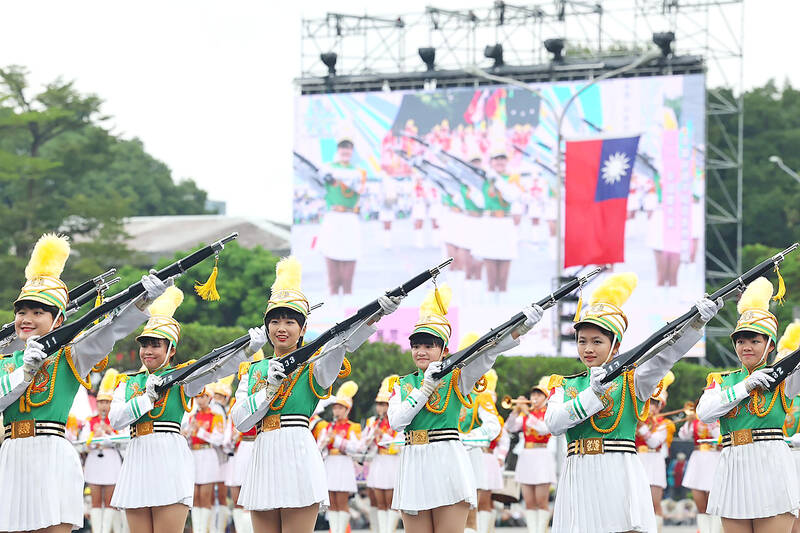
Photo: CNA
“We look forward to the gradual resumption of healthy and orderly cross-strait people-to-people exchanges after the loosening of border restrictions on both sides, thereby easing tensions in the Taiwan Strait,” she said.
Taiwan is on Thursday to reopen its borders, following severe restrictions for the past more than two years due to the COVID-19 pandemic. China continues to implement a “zero COVID-19” policy ahead of the 20th National Congress of the Chinese Communist Party, which begins on Sunday.
Tsai said China has threatened peace and stability in the Strait and the region through military intimidation, diplomatic pressure, trade obstructions and attempts to erase the sovereignty of Taiwan.
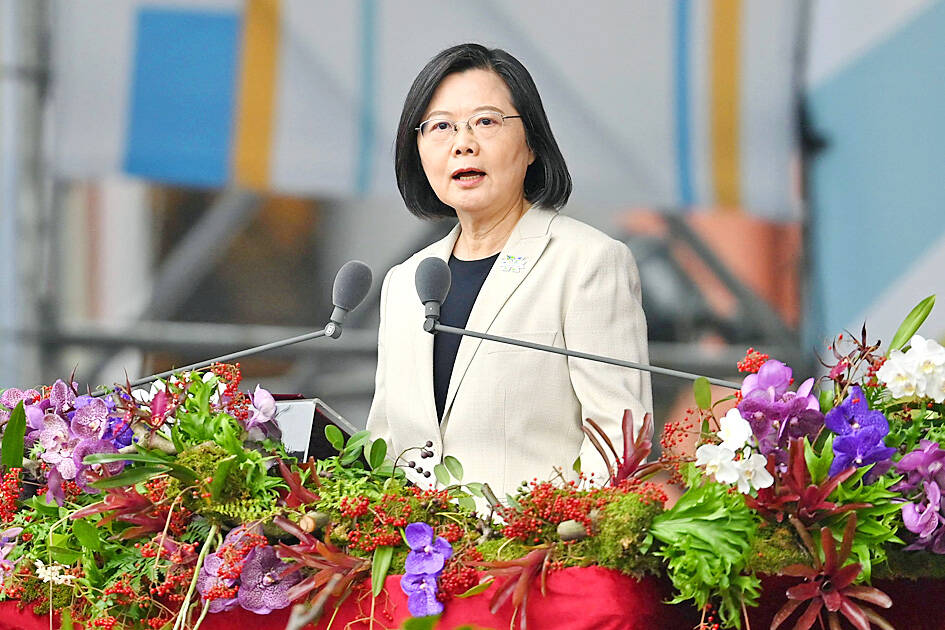
Photo: Sam Yeh, AFP
“During the past 73 years, Taiwanese have lived and grown together on this land, and have formed their own strong sense of identity and belonging. The broadest consensus among Taiwanese and various political parties is that we must defend our national sovereignty, and our free and democratic way of life. On this point, we have no room for compromise,” she said.
“Beijing authorities should not make any misjudgement on account of Taiwan’s vigorous democratic system,” Tsai said.
“They must not think there is room for compromise in Taiwanese’s commitment to democracy and freedom, or try to divide Taiwanese society by exploiting the fierce competition between our political parties,” she said.
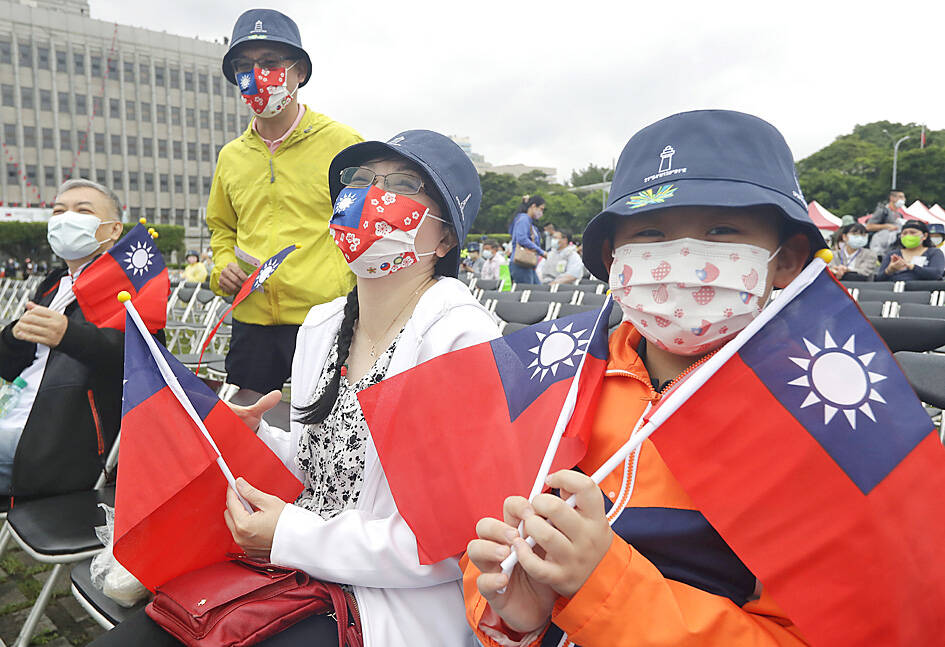
Photo: Chiang Ying-ying, AP
“Such beliefs and actions would not benefit cross-strait relations, and will only push the two sides further from each other,” she added.
Although Taiwan’s COVID-19 pandemic prevention efforts have earned global recognition and helped the nation achieve 6.75 percent economic growth last year, the strongest in the past few years, Tsai noted greater challenges in the post-pandemic era: high inflation in Europe and the US, a looming global recession, the restructuring of global supply chains, climate change, Russia’s invasion of Ukraine, and China’s increased military activities in the South and East China seas and the Taiwan Strait.
“These developments are inextricably connected with Taiwan,” Tsai said. “With Taiwan a part of this changing landscape, we cannot leave things to chance. Instead, we must stand up for our democracy, and prepare prudently and sufficiently to respond to any possible contingency.”
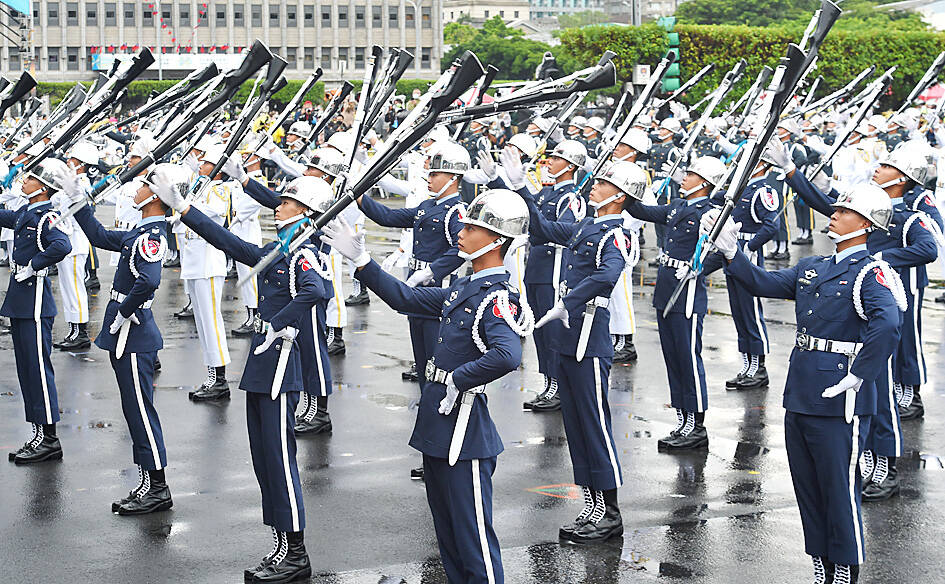
Photo: Liao Chen-huei, Taipei Times
Tsai pledged to improve the nation’s resilience in four key areas during the remaining two years of her term in office: economy and industry, national defense, social welfare, and a free and democratic government system.
Taiwan must continue to consolidate its advantages in the semiconductor sector, in addition to working to stabilize utility costs, boost investment in infrastructure, cultivate talent, ensure the security of critical infrastructure and achieve net zero carbon emissions by 2050, she said.
“I want to specifically emphasize one point to my fellow citizens and the international community: The concentration of the semiconductor sector in Taiwan is not a risk, but is the key to the reorganization of the global semiconductor industry,” Tsai said.
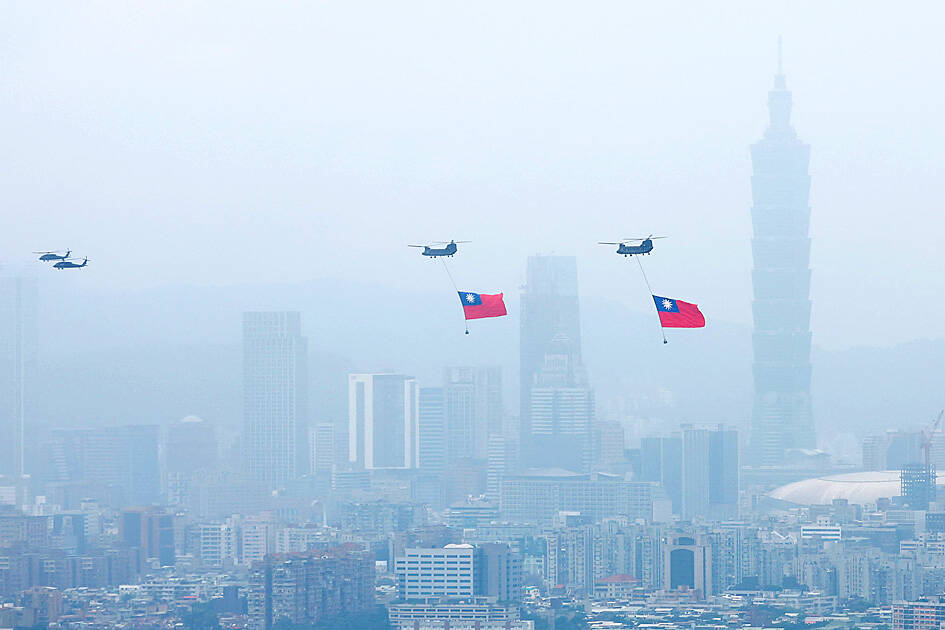
Photo: Carlos Garcia Rawlins, Reuters
To bolster Taiwan’s national defense capabilities and resilience, the government is ramping up mass production of precision missiles and high-performance naval vessels, she said.
It is also working to acquire small, highly mobile precision weapons to develop comprehensive asymmetric warfare capabilities, she added.
Taiwan’s indigenous submarine program made significant progress with the delivery of the nation’s first domestically developed and built 10,000-tonne landing platform dock Yushan two weeks ago, she said.
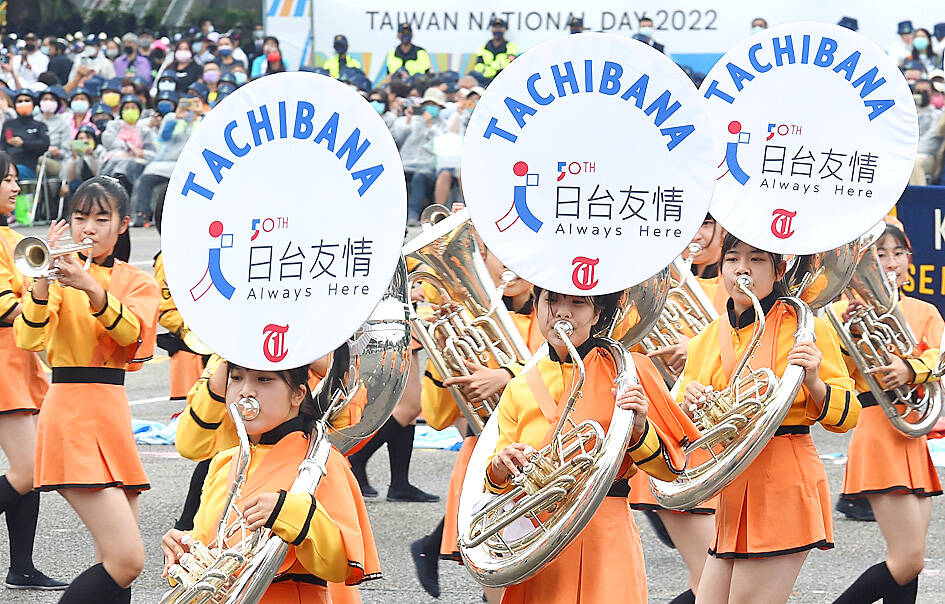
Photo: Liao Chen-huei, Taipei Times
An All-out Defense Mobilization Agency has been established to bolster military training capacity and refine reserve training programs, Tsai said.
“Through our actions, we are sending the message to the international community that Taiwan will take responsibility for its self-defense, that we will not leave anything to fate, and that we will work with our allies to jointly maintain security and stability in the region,” she said.
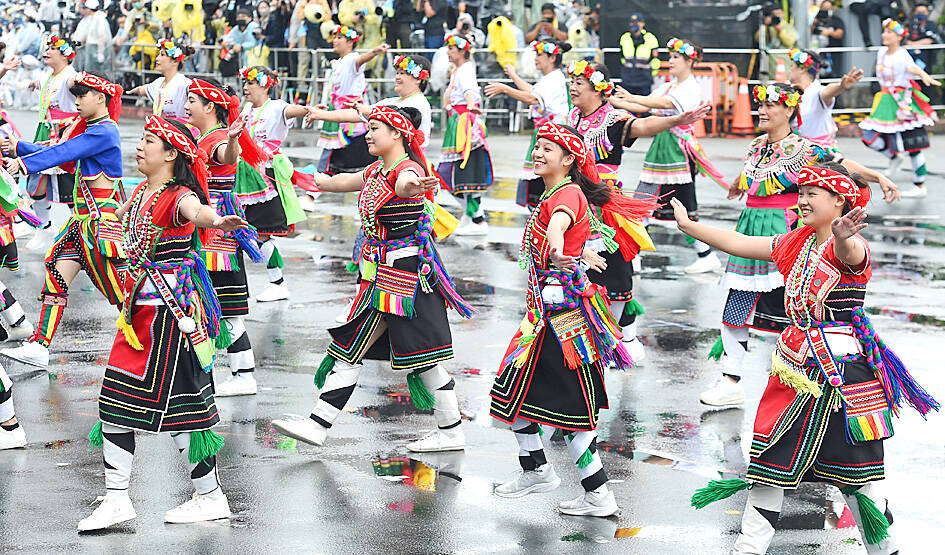
Photo: Liao Chen-huei, Taipei Times
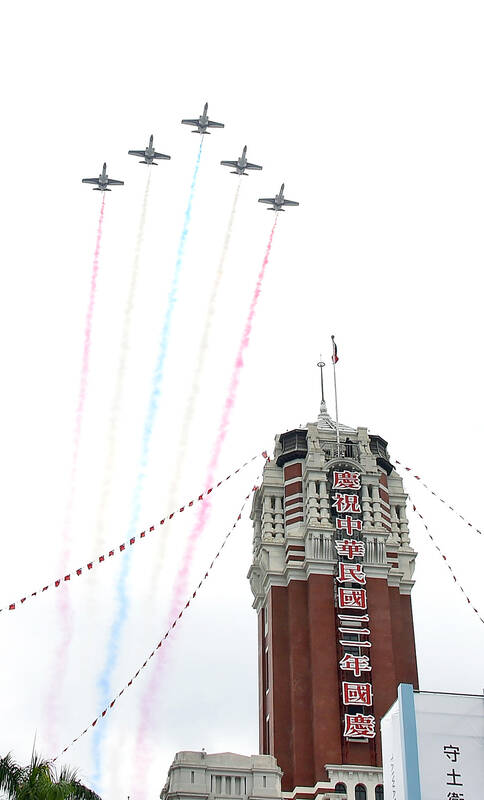
Photo: Tu Chien-jung, Taipei Times

AGING: As of last month, people aged 65 or older accounted for 20.06 percent of the total population and the number of couples who got married fell by 18,685 from 2024 Taiwan has surpassed South Korea as the country least willing to have children, with an annual crude birthrate of 4.62 per 1,000 people, Ministry of the Interior data showed yesterday. The nation was previously ranked the second-lowest country in terms of total fertility rate, or the average number of children a woman has in her lifetime. However, South Korea’s fertility rate began to recover from 2023, with total fertility rate rising from 0.72 and estimated to reach 0.82 to 0.85 by last year, and the crude birthrate projected at 6.7 per 1,000 people. Japan’s crude birthrate was projected to fall below six,

US President Donald Trump in an interview with the New York Times published on Thursday said that “it’s up to” Chinese President Xi Jinping (習近平) what China does on Taiwan, but that he would be “very unhappy” with a change in the “status quo.” “He [Xi] considers it to be a part of China, and that’s up to him what he’s going to be doing, but I’ve expressed to him that I would be very unhappy if he did that, and I don’t think he’ll do that. I hope he doesn’t do that,” Trump said. Trump made the comments in the context

SELF-DEFENSE: Tokyo has accelerated its spending goal and its defense minister said the nation needs to discuss whether it should develop nuclear-powered submarines China is ramping up objections to what it sees as Japan’s desire to acquire nuclear weapons, despite Tokyo’s longstanding renunciation of such arms, deepening another fissure in the two neighbors’ increasingly tense ties. In what appears to be a concerted effort, China’s foreign and defense ministries issued statements on Thursday condemning alleged remilitarism efforts by Tokyo. The remarks came as two of the country’s top think tanks jointly issued a 29-page report framing actions by “right-wing forces” in Japan as posing a “serious threat” to world peace. While that report did not define “right-wing forces,” the Chinese Ministry of Foreign Affairs was

PREPAREDNESS: Given the difficulty of importing ammunition during wartime, the Ministry of National Defense said it would prioritize ‘coproduction’ partnerships A newly formed unit of the Marine Corps tasked with land-based security operations has recently replaced its aging, domestically produced rifles with more advanced, US-made M4A1 rifles, a source said yesterday. The unnamed source familiar with the matter said the First Security Battalion of the Marine Corps’ Air Defense and Base Guard Group has replaced its older T65K2 rifles, which have been in service since the late 1980s, with the newly received M4A1s. The source did not say exactly when the upgrade took place or how many M4A1s were issued to the battalion. The confirmation came after Chinese-language media reported